Stalingrado
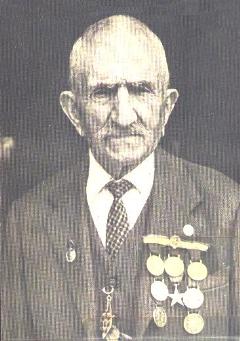
E' sicuramente cascina.
perché infatti l'ultima strofa: "sette operai, sette bicchieri che brindano a Lenin..." è riferita ai sette fratelli Cervi.
perché infatti l'ultima strofa: "sette operai, sette bicchieri che brindano a Lenin..." è riferita ai sette fratelli Cervi.
Giulio Breglia 29/1/2006 - 13:52
The Future

[1992]
Lyrics and Music by Leonard Cohen
Testo e musica di Leonard Cohen
Lyrics and Music by Leonard Cohen
Testo e musica di Leonard Cohen
Give me back my broken night
(continua)
(continua)
29/1/2006 - 00:42
Bone Bomb

da "Another Day on Earth" (2005)
"La canzone si basa su due articoli di giornale: uno raccontava la storia di una kamikaze donna, l’altro parlava di un dottore israeliano che descriveva lo scenario che incontrava dopo un attentato kamikaze: uno dei problemi più terribili che doveva affrontare era estrarre le mille schegge di ossa del kamikaze esploso dalla pelle dei feriti. Pezzettini di ossa volati ovunque. Dunque c’è l’immagine di questa donna, l’immagine (prima ancora che si facesse saltare in aria) di una "santa", di una "già morta" che aveva trovato la sua pace, la sua gioia nell’uccidere qualcun altro. È una nuova tragedia moderna."
(Brian Eno, intervistato da Silvia Boschero, L’UNITA’ – 15/06/2005
"La canzone si basa su due articoli di giornale: uno raccontava la storia di una kamikaze donna, l’altro parlava di un dottore israeliano che descriveva lo scenario che incontrava dopo un attentato kamikaze: uno dei problemi più terribili che doveva affrontare era estrarre le mille schegge di ossa del kamikaze esploso dalla pelle dei feriti. Pezzettini di ossa volati ovunque. Dunque c’è l’immagine di questa donna, l’immagine (prima ancora che si facesse saltare in aria) di una "santa", di una "già morta" che aveva trovato la sua pace, la sua gioia nell’uccidere qualcun altro. È una nuova tragedia moderna."
(Brian Eno, intervistato da Silvia Boschero, L’UNITA’ – 15/06/2005
my
(continua)
(continua)
29/1/2006 - 00:26
Percorsi:
L'Olocausto Palestinese
We Didn't Start The Fire

La canzone ripercorre più di 30 anni di storia, per i riferimenti rimandiamo a Octopus's Garden.
"The World's always been kinda messed up, it was messed up before I was born, it was messed up during the time that I lived and it will probably be messed up after I'm gone. That doesn't mean you don't try the best that you can and make this a better world."
"The World's always been kinda messed up, it was messed up before I was born, it was messed up during the time that I lived and it will probably be messed up after I'm gone. That doesn't mean you don't try the best that you can and make this a better world."
Harry Truman, Doris Day, Red China, Johnnie Ray,
(continua)
(continua)
29/1/2006 - 00:12
Danny Boy
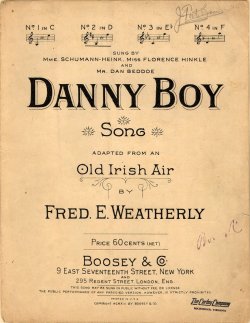
Parole di Frederick Weatherly (1910)
Adattate alla melodia "A Londonderry Air" nel 1913.
Accogliamo quella che è una delle più famose ballate irlandesi (il cui testo però è stato scritto da un avvocato inglese, Frederick Weatherly, che successivamente le adattò ad una melodia tradizionale, A Londonderry Air, decretando il succeso della canzone) tra le canzoni contro la guerra, in base all'interpretazione secondo la quale le parole sono dirette da una madre (o da un padre), ormai vecchia e che sente la fine vicina, al giovane figlio costretto a partire per la guerra e che teme di non rivedere mai più.
(Lorenzo Masetti)
Per una storia completa della canzone e del suo inaspettato successo rimandiamo a Danny Boy—the mystery solved!.
Il testo qui riportato è l'originale di Weatherly ma ne esistono numerosissime varianti.
Adattate alla melodia "A Londonderry Air" nel 1913.
Accogliamo quella che è una delle più famose ballate irlandesi (il cui testo però è stato scritto da un avvocato inglese, Frederick Weatherly, che successivamente le adattò ad una melodia tradizionale, A Londonderry Air, decretando il succeso della canzone) tra le canzoni contro la guerra, in base all'interpretazione secondo la quale le parole sono dirette da una madre (o da un padre), ormai vecchia e che sente la fine vicina, al giovane figlio costretto a partire per la guerra e che teme di non rivedere mai più.
(Lorenzo Masetti)
Per una storia completa della canzone e del suo inaspettato successo rimandiamo a Danny Boy—the mystery solved!.
Il testo qui riportato è l'originale di Weatherly ma ne esistono numerosissime varianti.
Oh Danny boy, the pipes, the pipes are calling
(continua)
(continua)
28/1/2006 - 20:25
Student Demonstration Time
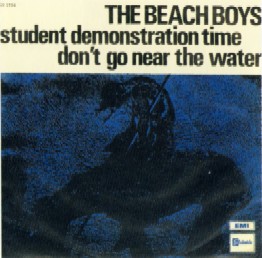
da Surf's Up (1971)
Based on "Riot in Cell Block Number 9" -originally written by Jerry Leiber and Mike Stoller in 1954
Based on "Riot in Cell Block Number 9" -originally written by Jerry Leiber and Mike Stoller in 1954
If you lived through the 60s, the civil riots, the unrest, the anti-war demonstrations, the crowds of unruly students in the streets, with hundreds of young soldiers dying every day -- every day, and in-depth TV coverage of people being shot at close range coming into our living rooms every night, you might have more understanding of "the why and wherefore" of the song.
Michael was seeing all this going on in Santa Barbara, California, where he lived. It was in his front yard. It was in all our lives. It was a sick time. The country was sick. And much of it was needless. Michael was moved to write a song about war protest. His approach was to offer vocal advice to the listener as to what to do when you may be caught up in one of these civil unrests -- so as not to get killed. Remember, Kent State was still in the news when the lyrics were written.
Stephen W. Desper, engineer of the Beach Boys
Michael was seeing all this going on in Santa Barbara, California, where he lived. It was in his front yard. It was in all our lives. It was a sick time. The country was sick. And much of it was needless. Michael was moved to write a song about war protest. His approach was to offer vocal advice to the listener as to what to do when you may be caught up in one of these civil unrests -- so as not to get killed. Remember, Kent State was still in the news when the lyrics were written.
Stephen W. Desper, engineer of the Beach Boys
Starting out with Berkeley Free Speech
(continua)
(continua)
28/1/2006 - 20:01
Birmingham Six
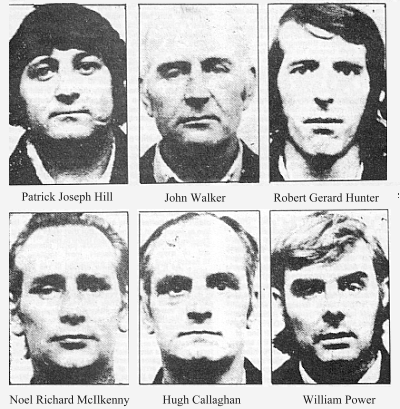
[1988]
Lyrics & Music by Shane MacGowan
Album: If I Should Fall from Grace with God (in medley con Streets of Sorrow)
Hugh Callaghan, Patrick Hill, Gerard Hunter, Richard McIlkenny, William Power e John Walker, i Birmingham Six, sei uomini falsamente accusati di aver piazzato una bomba a Birmingham nel 1974 che provocò la morte di 21 persone.
Nonostante che la polizia inglese conoscesse i nomi dei veri terroristi, i sei furono pestati, torturati e infine incarcerati. La loro innocenza venne riconosciuta solo nel 1991.
Sorte simile toccò ai Guildford Four: Paul Hill, Gerry Conlon, Patrick (Paddy) Armstrong e Carole Richardson, incarcerati per 15 anni.
Vedi anche The Annotated Pogues Lyrics ed un articolo di Silvia Morosi
Lyrics & Music by Shane MacGowan
Album: If I Should Fall from Grace with God (in medley con Streets of Sorrow)
Hugh Callaghan, Patrick Hill, Gerard Hunter, Richard McIlkenny, William Power e John Walker, i Birmingham Six, sei uomini falsamente accusati di aver piazzato una bomba a Birmingham nel 1974 che provocò la morte di 21 persone.
Nonostante che la polizia inglese conoscesse i nomi dei veri terroristi, i sei furono pestati, torturati e infine incarcerati. La loro innocenza venne riconosciuta solo nel 1991.
Sorte simile toccò ai Guildford Four: Paul Hill, Gerry Conlon, Patrick (Paddy) Armstrong e Carole Richardson, incarcerati per 15 anni.
Vedi anche The Annotated Pogues Lyrics ed un articolo di Silvia Morosi
There were six men in Birmingham
(continua)
(continua)
27/1/2006 - 15:10
Percorsi:
Dalle galere del mondo, I conflitti Irlandesi
Why Can't We Live Together?
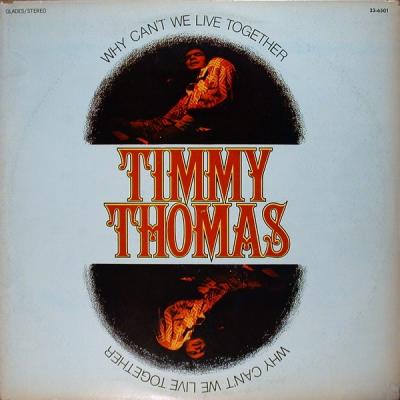
[1972]
Parole e musica di Timothy E. "Timmy" Thomas
Singolo estratto dall'album "Why Can't We Live Together"
Molto celebre anche l'elegantissima cover di Helen Folasade Adu, in arte Sade, nel suo splendido disco d'esordio del 1984, intitolato "Diamond Life"
(Bernart Bartleby)
Parole e musica di Timothy E. "Timmy" Thomas
Singolo estratto dall'album "Why Can't We Live Together"
Molto celebre anche l'elegantissima cover di Helen Folasade Adu, in arte Sade, nel suo splendido disco d'esordio del 1984, intitolato "Diamond Life"
(Bernart Bartleby)
Tell me why, tell me why, tell me why.
(continua)
(continua)
27/1/2006 - 14:13
The Winter Of The Long Hot Summer
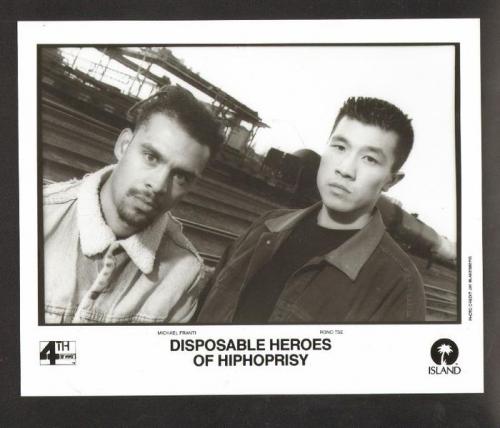
Album: Hypocrisy Is the Greatest Luxury (1992)
It all seemed so idiotic all the accusations of unpatriotic
(continua)
(continua)
27/1/2006 - 13:57
Άσμα ασμάτων ("Cantico dei Cantici"), Ο Αντώνης ("Antonis"), 'Αμα τελειώσει ο πόλεμος ("Quando finirà la guerra") e Ο δραπέτης ("L'evaso"): le quattro canzoni che formano la "Trilogia di Mauthausen" del grande poeta e drammaturgo greco Iakovos Kambanellis, musicate da Mikis Theodorakis e interpretate da nomi come quello di Maria Farandouri. Uno dei più importanti contributi alle CCG per il 2006, che vi invitiamo a leggere oggi, 27 gennaio, Giornata Mondiale della Memoria di Auschwitz e degli altri campi di sterminio nazisti.
Riccardo Venturi 27/1/2006 - 10:44
Lamento

Canzone tratta da una poesia di Hermann Hesse, dal Glasperlenspiel ("Il libro delle perle di vetro").
Un canto-poesia la cui bellezza si commenta da sola. [RV]
Un canto-poesia la cui bellezza si commenta da sola. [RV]
Non c'è concesso di essere, noi siamo
(continua)
(continua)
inviata da Riccardo Venturi 26/1/2006 - 22:44
Amore e Odio
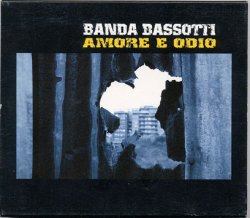
(2005)
Amore e Odio
(Musica: Angelo "Sigaro" Conti - Testo: David Cacchione)
"Il nostro amico fotografo Tano D'Amico un giorno ci ha raccontato che in un suo precedente viaggio in Palestina, diversi anni fa, aveva fatto un servizio fotografico nei campi profughi. Li' aveva fotografato una famiglia, madre padre e figlia. Nel marzo 2002 siamo stati in Palestina e Tano e' tornato a trovare la famiglia della foto. La bambina nel frattempo era cresciuta e da poco si era fatta esplodere come kamikaze."
Amore e Odio
(Musica: Angelo "Sigaro" Conti - Testo: David Cacchione)
"Il nostro amico fotografo Tano D'Amico un giorno ci ha raccontato che in un suo precedente viaggio in Palestina, diversi anni fa, aveva fatto un servizio fotografico nei campi profughi. Li' aveva fotografato una famiglia, madre padre e figlia. Nel marzo 2002 siamo stati in Palestina e Tano e' tornato a trovare la famiglia della foto. La bambina nel frattempo era cresciuta e da poco si era fatta esplodere come kamikaze."
Amore ancora scorre l'Odio nelle vene
(continua)
(continua)
26/1/2006 - 21:22
Italiano
[2006]
Testo (e musica?) di Redshadow
Dal newsgroup it.fan.musica.guccini, 25 gennaio 2006. Grazie di cuore al hermano Redshadow per il permesso di inserirla nelle CCG. [RV]
Testo (e musica?) di Redshadow
Dal newsgroup it.fan.musica.guccini, 25 gennaio 2006. Grazie di cuore al hermano Redshadow per il permesso di inserirla nelle CCG. [RV]
Sono italiano, forse romano
(continua)
(continua)
inviata da Riccardo Venturi 26/1/2006 - 19:20
I tre potenti

Da cantarsi sull'aria della canzone popolare pistoiese "Le tre sorelle", eseguita da Riccardo Tesi e la Banditaliana.
C’erano tre potenti,
(continua)
(continua)
26/1/2006 - 19:09
La battaglia di San Lorenzo
anonimo
[1921]
"Ma quali sono i canti della Resistenza più celebri? Se consideriamo la categoria in senso lato, sicuramente possiamo considerare "materiali resistenti" i canti del biennio '19-'20, quando le avanguardie operaie presero coscienza della propria condizione all'interno del capitalismo italiano nascente. Di lì a poco il fascismo avrebbe iniziato la sua scalata al potere. La Battaglia di San Lorenzo del '21 che può essere considerata a pieno titolo la madre di tutte canzone antifasciste, racconta la connivenza della Guardia Regia e delle squadracce fasciste e della loro violenza contro un gruppo di ferrovieri dissenzienti."
Da questa pagina.
Il testo è invece ripreso da Canti di Lotta. La canzone è sull'aria della Leggenda del Piave.
"Ma quali sono i canti della Resistenza più celebri? Se consideriamo la categoria in senso lato, sicuramente possiamo considerare "materiali resistenti" i canti del biennio '19-'20, quando le avanguardie operaie presero coscienza della propria condizione all'interno del capitalismo italiano nascente. Di lì a poco il fascismo avrebbe iniziato la sua scalata al potere. La Battaglia di San Lorenzo del '21 che può essere considerata a pieno titolo la madre di tutte canzone antifasciste, racconta la connivenza della Guardia Regia e delle squadracce fasciste e della loro violenza contro un gruppo di ferrovieri dissenzienti."
Da questa pagina.
Il testo è invece ripreso da Canti di Lotta. La canzone è sull'aria della Leggenda del Piave.
Il padre di famiglia se ne stava al suo lavoro
(continua)
(continua)
inviata da Riccardo Venturi 26/1/2006 - 18:03
R60
Canto della provincia di Reggio Emilia [1951].
Testo di Ermanno Rivetti
Musica di Michele Isernia
Riprendo il testo dal sito di Franco Frascolla, con lievi correzioni testuali.
L' "R60" è un potente trattore prodotto dalle OMI-Officine Meccaniche Reggiane di Reggio Emilia, nel corso di uno dei primi esperimenti di autogestione operaia di una fabbrica in Italia. Tra il 1950 e il 1951 le Officine Reggiane vennero occupate dai lavoratori in sciopero contro la direzione della fabbrica, impegnata da sempre nelle costruzioni di automezzi e componenti per uso militare; nel corso dell'occupazione, per dimostrare la capacità gestionale delle maestranze in lotta, fu decisa la progettazione e la realizzazione di un trattore, di uno strumento di lavoro e di pace. Un episodio straordinario che fu celebrato con questo canto popolare. Sulla sua scrivania, Alcide Cervi tenne fino alla sua morte il... (continua)
Testo di Ermanno Rivetti
Musica di Michele Isernia
Riprendo il testo dal sito di Franco Frascolla, con lievi correzioni testuali.
L' "R60" è un potente trattore prodotto dalle OMI-Officine Meccaniche Reggiane di Reggio Emilia, nel corso di uno dei primi esperimenti di autogestione operaia di una fabbrica in Italia. Tra il 1950 e il 1951 le Officine Reggiane vennero occupate dai lavoratori in sciopero contro la direzione della fabbrica, impegnata da sempre nelle costruzioni di automezzi e componenti per uso militare; nel corso dell'occupazione, per dimostrare la capacità gestionale delle maestranze in lotta, fu decisa la progettazione e la realizzazione di un trattore, di uno strumento di lavoro e di pace. Un episodio straordinario che fu celebrato con questo canto popolare. Sulla sua scrivania, Alcide Cervi tenne fino alla sua morte il... (continua)
Schiere d'eroi umili ed offesi
(continua)
(continua)
inviata da Riccardo Venturi 26/1/2006 - 17:56
Dachau Blues
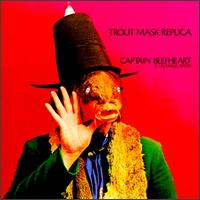
[1969]
Album: Trout Mask Replica
"By all means, Trout Mask Replica is a joke - or a 'mystification', if you prefer. It's not unprecedented: after all, Beefheart the joker took his cues from his good old pal Frank Zappa and certain other freaky artists. But it's probably the grandest and most flawlessly and intelligently executed mystification in music as a whole, or rock music at least: a grandiose, 79-minute project, with specially trained musicians, thought out lyrics and actually a lot of care thrown into the whole project. The most successful mystification is the one that stands the closest to the truth, isn't it? But it's still a mystification. Beefheart's lyrics are fun, but for the most part they're dadaist and sound good just for the sake of sounding good; when he goes for something a little sharper, like his thoughts on World War Two in 'Dachau Blues', he shows that he can be goofy and serious at the same time, but that's very rarely the point."
From This page
Album: Trout Mask Replica
"By all means, Trout Mask Replica is a joke - or a 'mystification', if you prefer. It's not unprecedented: after all, Beefheart the joker took his cues from his good old pal Frank Zappa and certain other freaky artists. But it's probably the grandest and most flawlessly and intelligently executed mystification in music as a whole, or rock music at least: a grandiose, 79-minute project, with specially trained musicians, thought out lyrics and actually a lot of care thrown into the whole project. The most successful mystification is the one that stands the closest to the truth, isn't it? But it's still a mystification. Beefheart's lyrics are fun, but for the most part they're dadaist and sound good just for the sake of sounding good; when he goes for something a little sharper, like his thoughts on World War Two in 'Dachau Blues', he shows that he can be goofy and serious at the same time, but that's very rarely the point."
From This page
Dachau blues those poor Jews
(continua)
(continua)
26/1/2006 - 17:09
Percorsi:
Campi di sterminio
We Gotta Get Out of This Place

(1965)
Parole di Cynthia Weil
Musica di Barry Mann
La canzone non si riferisce direttamente alla guerra, tutt'altro... parla di un figlio che vede morire il padre e decide di andarsene dalla città dove da sempre si vive in povertà.
Tuttavia il ritornello si adatta perfettamente alla situazione del Vietnam e così venne interpretata dai soldati in Vietnam. Se non uscivano dal Vietnam, era perché combattere sarebbe stata l'ultima cosa che avrebbero fatto! Diventò in pratica l'inno delle truppe americane in Vietnam.
This song, released in 1966, was written about a poor boy living in England and watching his father die. However, the lyrics of the refrain can be applied very easily to the situation of the average GI in Vietnam.
If an American soldier didn't get out of Vietnam, it was because fighting in Vietnam was the last thing that soldier ever did. "We Gotta Get Out of This Place" was... (continua)
Parole di Cynthia Weil
Musica di Barry Mann
La canzone non si riferisce direttamente alla guerra, tutt'altro... parla di un figlio che vede morire il padre e decide di andarsene dalla città dove da sempre si vive in povertà.
Tuttavia il ritornello si adatta perfettamente alla situazione del Vietnam e così venne interpretata dai soldati in Vietnam. Se non uscivano dal Vietnam, era perché combattere sarebbe stata l'ultima cosa che avrebbero fatto! Diventò in pratica l'inno delle truppe americane in Vietnam.
This song, released in 1966, was written about a poor boy living in England and watching his father die. However, the lyrics of the refrain can be applied very easily to the situation of the average GI in Vietnam.
If an American soldier didn't get out of Vietnam, it was because fighting in Vietnam was the last thing that soldier ever did. "We Gotta Get Out of This Place" was... (continua)
In this dirty old part of the city
(continua)
(continua)
26/1/2006 - 16:40
Percorsi:
Guerra in Vietnam: vista dagli USA
Katanga
Gli Anarchici milanesi
La canzone si riferisce alle manifestazioni organizzate un anno dopo la strage di Piazza Fontana (12 dicembre 1970), durante la quale Saverio Saltarelli fu ucciso dalle "forze dell'ordine". Il testo è ripreso da Il Deposito-Canti di lotta. Per l'esatta attribuzione del brano si veda questa nota di Matteo Ogliari, che ringaziamo. [CCG/AWS Staff]
Primo anniversario della strage,
(continua)
(continua)
inviata da Riccardo Venturi 26/1/2006 - 15:10
My Rainbow Race
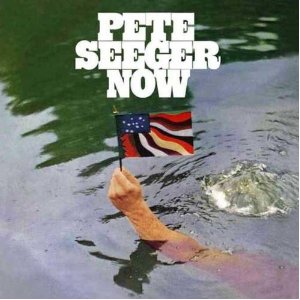
[1967]
Words and Music by Pete Seeger
Parole e musica di Pete Seeger
Album: Pete Seeger Now
Non facciamo alcuna fatica nel capire perchè una canzone come questa sia odiata da individui del genere. E ci permettiamo di aggiungere che l'odio di un assassino fanatico è la migliore prova di quanto una canzone possa essere importante, quando sa andare dritta al cuore delle cose. E meno che mai ci stupiamo che sia proprio di Pete Seeger. [CCG/AWS Staff]
We have no difficulty in understanding why a song like this is hated by such kind of a person. And we take the liberty of saying that the hate shown by a fanatic murderer is the best evidence how much a song can be important, when it knows how to go into the very heart of things. We aren't amazed it's a song by Pete Seeger. [AWS Staff]
Words and Music by Pete Seeger
Parole e musica di Pete Seeger
Album: Pete Seeger Now
Non facciamo alcuna fatica nel capire perchè una canzone come questa sia odiata da individui del genere. E ci permettiamo di aggiungere che l'odio di un assassino fanatico è la migliore prova di quanto una canzone possa essere importante, quando sa andare dritta al cuore delle cose. E meno che mai ci stupiamo che sia proprio di Pete Seeger. [CCG/AWS Staff]
We have no difficulty in understanding why a song like this is hated by such kind of a person. And we take the liberty of saying that the hate shown by a fanatic murderer is the best evidence how much a song can be important, when it knows how to go into the very heart of things. We aren't amazed it's a song by Pete Seeger. [AWS Staff]
One blue sky above us
(continua)
(continua)
26/1/2006 - 14:21
Save The Country
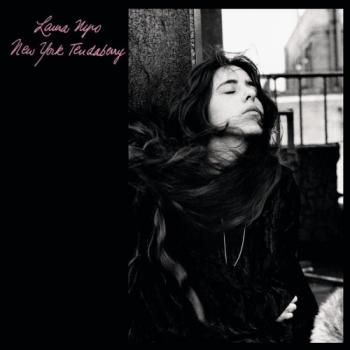
Album: New York Tendaberry (1969)
Incisa anche dai Fifth Dimension
Incisa anche dai Fifth Dimension
Come on, people! Come on, children!
(continua)
(continua)
26/1/2006 - 13:47
Here Comes President Kill Again
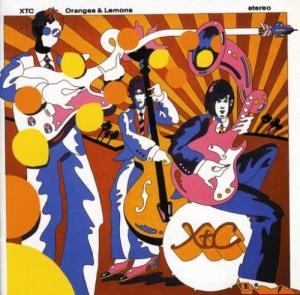
(Colin Moulding)
Album: "Oranges & Lemons" (1989)
Album: "Oranges & Lemons" (1989)
Here comes President Kill again,
(continua)
(continua)
26/1/2006 - 13:39
Comandante
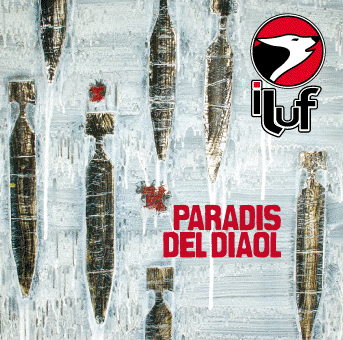
[1997]
da "Fuori dal controllo"
Riproposto (con nuovo arrangiamento) nel nuovo album dei Gang, Il seme e la speranza [2006].
Ripresa anche da i Luf in Paradis del diaol [2007]
Dedicata al subcomandante Marcos e all'EZLN, l'unico esercito al mondo che "nasce per sciogliersi".
"Esortato a dire la verità e niente altro che la verità, l'individuo in questione dichiarò di chiamari Marcos dei Monti della Selva, figlio del vecchio Antonio e di Dona Juanita, fratello di Antonio figlio, Ramona e Susana, zio della Tonita, del Beto, della Eva e dell'Heriberto, che nacque nell'accampamento guerrigliero di Agua Fría, Selva Lacandona, Chiapas, una notte di agosto del 1984."
Marcos è la selva, è il ponte fra il mondo indigeno e il mondo esterno. E' l'uomo capace di accendere il sogno in ogni parte del pianeta. Colui che ha scoperto, dietro il dolore, la speranza. Un sub-Comandante che ha il fiore della parola, perché la lotta continua nelle parole prima di qualsiasi altro posto. [Dal libretto de Il seme e la speranza]
da "Fuori dal controllo"
Riproposto (con nuovo arrangiamento) nel nuovo album dei Gang, Il seme e la speranza [2006].
Ripresa anche da i Luf in Paradis del diaol [2007]
Dedicata al subcomandante Marcos e all'EZLN, l'unico esercito al mondo che "nasce per sciogliersi".
"Esortato a dire la verità e niente altro che la verità, l'individuo in questione dichiarò di chiamari Marcos dei Monti della Selva, figlio del vecchio Antonio e di Dona Juanita, fratello di Antonio figlio, Ramona e Susana, zio della Tonita, del Beto, della Eva e dell'Heriberto, che nacque nell'accampamento guerrigliero di Agua Fría, Selva Lacandona, Chiapas, una notte di agosto del 1984."
Marcos è la selva, è il ponte fra il mondo indigeno e il mondo esterno. E' l'uomo capace di accendere il sogno in ogni parte del pianeta. Colui che ha scoperto, dietro il dolore, la speranza. Un sub-Comandante che ha il fiore della parola, perché la lotta continua nelle parole prima di qualsiasi altro posto. [Dal libretto de Il seme e la speranza]
Comandante comandante
(continua)
(continua)
26/1/2006 - 13:30
We've been Asking Questions
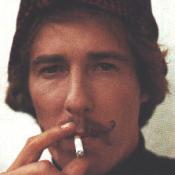
Una canzone (mai registrata da lui) dell'ex cantante dei Mamas and Papas, che l'ha scritta poco prima della sua morte nel 2001.
È stata infine incisa da Scott McKenzie (ricordate? "If You're Going To San Francisco (Be Sure To Wear Some Flowers In Your Hair)") e inclusa alla fine di un documentario dal titolo "My Generation---The '60's Experience". Tuttavia si tratta di una canzone molto attuale.
Riportiamo il commento tratto dal sito di Scott McKenzie
First, some background on this unrecorded song:
When John's youngest son became old enough to serve in the military, the whole world had pretty much accepted the inevitability of war between Iraq and the United States, that it was only a matter of time.
Even though John knew that the draft no longer existed, the idea of his son going to war weighed heavily on his heart and mind. He thought that a song about it might help and then composed... (continua)
È stata infine incisa da Scott McKenzie (ricordate? "If You're Going To San Francisco (Be Sure To Wear Some Flowers In Your Hair)") e inclusa alla fine di un documentario dal titolo "My Generation---The '60's Experience". Tuttavia si tratta di una canzone molto attuale.
Riportiamo il commento tratto dal sito di Scott McKenzie
First, some background on this unrecorded song:
When John's youngest son became old enough to serve in the military, the whole world had pretty much accepted the inevitability of war between Iraq and the United States, that it was only a matter of time.
Even though John knew that the draft no longer existed, the idea of his son going to war weighed heavily on his heart and mind. He thought that a song about it might help and then composed... (continua)
We've been asking questions of everyone we meet
(continua)
(continua)
26/1/2006 - 00:37
A Fine Line
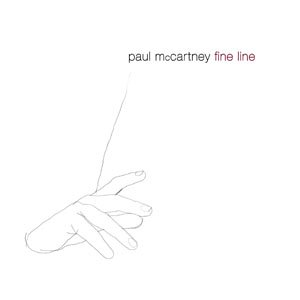
da "Chaos and Creation in the Backyard" (2005)
The song has obvious tones of being an anti-war song.
This is a perfect description of our problems in Iraq. Great tune, good message, and a wonderful start to the album.
Robert Rouse
The song has obvious tones of being an anti-war song.
This is a perfect description of our problems in Iraq. Great tune, good message, and a wonderful start to the album.
Robert Rouse
There is a fine line, between recklessness and courage
(continua)
(continua)
26/1/2006 - 00:30
(What's So Funny 'Bout) Peace, Love, and Understanding

da "The New Favourites of Brinsley Schwarz" (1974)
Scritta da Nick Lowe per il suo gruppo, Brinsley Schwarz, la canzone è universalmente nota grazie alla versione di Elvis Costello & The Attractions che la incisero nel 1979.
La canzone è stata incisa anche da Curtis Stigers (la sua versione fa parte della colonna sonora del film "The Bodyguard") dai Wallflowers e recentemente cantata addirittura dagli Audioslave.
(What's So Funny 'Bout) Peace, Love, and Understanding is a song written by English musician Nick Lowe. The song was originally released in 1974 on the album The New Favourites of Brinsley Schwarz by Lowe's band Brinsley Schwarz.
The cover by Elvis Costello & The Attractions is the version of the song that most people know but, strictly speaking, Elvis Costello & The Attractions never recorded this song. It was originally the B side of Lowe's American Squirm and... (continua)
Scritta da Nick Lowe per il suo gruppo, Brinsley Schwarz, la canzone è universalmente nota grazie alla versione di Elvis Costello & The Attractions che la incisero nel 1979.
La canzone è stata incisa anche da Curtis Stigers (la sua versione fa parte della colonna sonora del film "The Bodyguard") dai Wallflowers e recentemente cantata addirittura dagli Audioslave.
(What's So Funny 'Bout) Peace, Love, and Understanding is a song written by English musician Nick Lowe. The song was originally released in 1974 on the album The New Favourites of Brinsley Schwarz by Lowe's band Brinsley Schwarz.
The cover by Elvis Costello & The Attractions is the version of the song that most people know but, strictly speaking, Elvis Costello & The Attractions never recorded this song. It was originally the B side of Lowe's American Squirm and... (continua)
As I walk through
(continua)
(continua)
26/1/2006 - 00:09
Dopo tre giorni di strada asfaltata
anonimo
"Durante la Resistenza era il canto della 28° Brigata Garibaldi dedicata a Mario Gordini (1911-1944), di Ravenna, partigiano fucilato dai tedeschi insieme al forlivese Settimio Garavini."
Il testo è ripreso invece da questa pagina, con l'avvertenza che abbiamo, dopo un controllo, sostituito l'incongruente nome di "Mario Borghese" con quello corretto di "Mario Gordini".
La musica ricalca l'aria di una canzone, “Monte Canino”, nota durante la la 1° Guerra Mondiale.
L'autore di questa canzone non è conosciuto.
Gli esecutori del brano non sono conosciuti.
Il testo è ripreso invece da questa pagina, con l'avvertenza che abbiamo, dopo un controllo, sostituito l'incongruente nome di "Mario Borghese" con quello corretto di "Mario Gordini".
La musica ricalca l'aria di una canzone, “Monte Canino”, nota durante la la 1° Guerra Mondiale.
L'autore di questa canzone non è conosciuto.
Gli esecutori del brano non sono conosciuti.
Dopo tre giorni di strada asfaltata:
(continua)
(continua)
inviata da Riccardo Venturi 25/1/2006 - 16:53
A Franco
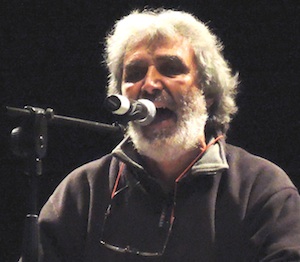
[1972]
Parole e musica / Lyrics and music / Paroles et musique / Sanat ja sävel: Franco "Foka" Rossi
Canzone, il cui testo riprendo da "La musica dell'altra Italia" che lo riprende a sua volta da S.Catanuto e F.Schirone, "Il canto anarchico in Italia", dedicata all'uccisione di Franco Serantini da parte della polizia a Pisa il 5 maggio 1972. Si veda meglio a tale riguardo La ballata di Franco Serantini. Il testo è ora disponibile anche su Berretto Frigio - Cantate di Lotta e Resistenza (gruppo di cui Fabio "Foka" Rossi è fondatore e membro). [RV]
Franco Serantini nasce a Cagliari il 16 luglio del 1951. Abbandonato all’orfanotrofio, vi resta per due anni, sino a quando viene dato in affidamento a due coniugi siciliani: la madre adottiva però muore per un male incurabile e Franco viene temporaneamente affidato ai genitori della sfortunata donna.
Passa la sua gioventù da un istituto all'altro,... (continua)
Parole e musica / Lyrics and music / Paroles et musique / Sanat ja sävel: Franco "Foka" Rossi
Canzone, il cui testo riprendo da "La musica dell'altra Italia" che lo riprende a sua volta da S.Catanuto e F.Schirone, "Il canto anarchico in Italia", dedicata all'uccisione di Franco Serantini da parte della polizia a Pisa il 5 maggio 1972. Si veda meglio a tale riguardo La ballata di Franco Serantini. Il testo è ora disponibile anche su Berretto Frigio - Cantate di Lotta e Resistenza (gruppo di cui Fabio "Foka" Rossi è fondatore e membro). [RV]
Franco Serantini nasce a Cagliari il 16 luglio del 1951. Abbandonato all’orfanotrofio, vi resta per due anni, sino a quando viene dato in affidamento a due coniugi siciliani: la madre adottiva però muore per un male incurabile e Franco viene temporaneamente affidato ai genitori della sfortunata donna.
Passa la sua gioventù da un istituto all'altro,... (continua)
Avevi vent'anni e sei morto
(continua)
(continua)
inviata da Riccardo Venturi 25/1/2006 - 16:22
Отряд не заметил потери бойца

Lyrics/Testo
From the album / Dall'album Прыг Скок
From the album / Dall'album Прыг Скок
Глупый мотылек догорал на свечке.
(continua)
(continua)
inviata da Riccardo Venturi 25/1/2006 - 16:11
Никто не хотел умирать

[1989]
Album: Тошнота
Nessuno voleva morire
Commento di ΔΙΩRAMA Poco Ligio All'Ufficialità! [al suo primo contributo])
I Graždanskaja Oborona sono stati tra i primi artisti russi ad esportare la cultura punk dai paesi anglosassoni. Sono una delle band punk-rock più stimate dalla critica e apprezzate dai fan. Il loro nome, "Гражданская Оборона", significa "Protezione Civile". Da notare però che la Protezione Civile Russa, molto cara ai russi, adempie a mansioni molto al di là dei compiti della Protezione Civile Italiana, e perciò è più assimilabile all'Arma dei Carabinieri, intervenendo talvolta anche in operazioni militari. Spesso il nome della band è abbreviato in "ГО", le iniziali di "Гражданская Оборона", o ad interpretazione inglese "Vai!", o anche in "ГрОб", cioé "bara", contribuendo a creare anche un alone di macabro o quantomeno di malinconico attorno alla fama della band. La... (continua)
Album: Тошнота
Nessuno voleva morire
Commento di ΔΙΩRAMA Poco Ligio All'Ufficialità! [al suo primo contributo])
I Graždanskaja Oborona sono stati tra i primi artisti russi ad esportare la cultura punk dai paesi anglosassoni. Sono una delle band punk-rock più stimate dalla critica e apprezzate dai fan. Il loro nome, "Гражданская Оборона", significa "Protezione Civile". Da notare però che la Protezione Civile Russa, molto cara ai russi, adempie a mansioni molto al di là dei compiti della Protezione Civile Italiana, e perciò è più assimilabile all'Arma dei Carabinieri, intervenendo talvolta anche in operazioni militari. Spesso il nome della band è abbreviato in "ГО", le iniziali di "Гражданская Оборона", o ad interpretazione inglese "Vai!", o anche in "ГрОб", cioé "bara", contribuendo a creare anche un alone di macabro o quantomeno di malinconico attorno alla fama della band. La... (continua)
Залеплен гневом и штукатуркой
(continua)
(continua)
inviata da Riccardo Venturi 25/1/2006 - 14:18
Auschwitz, o Canzone del bambino nel vento

LATINO / LATIN / LATIN / LATINA
Versione latina di Riccardo Venturi
Latin version by Riccardo Venturi
Version en latin par Riccardo Venturi
Riccardo Venturin latinankielinen versio
MMVI
Secondo quanto ha raccontato Francesco Guccini stesso (si veda il video allegato), Auschwitz fu scritta nel 1964 su un foglio di quaderno (si veda la sua immagine) esattamente mentre stava preparando un esame universitario di latino. In un certo senso, quindi, il latino è legato alla storia di questa canzone. La seguente versione latina è pienamente cantabile e, anzi, potrà persino essere cantata qualora Francesco Guccini torni a trovare S.S. il Papa, come ha fatto alcun tempo fa. [RV]
Versione latina di Riccardo Venturi
Latin version by Riccardo Venturi
Version en latin par Riccardo Venturi
Riccardo Venturin latinankielinen versio
MMVI
"Franciscus Guccini composuit a.D. MCMLXIV
Richardus Venturi vertit in Latinum sermonem a.D. MMVI"
Richardus Venturi vertit in Latinum sermonem a.D. MMVI"
Secondo quanto ha raccontato Francesco Guccini stesso (si veda il video allegato), Auschwitz fu scritta nel 1964 su un foglio di quaderno (si veda la sua immagine) esattamente mentre stava preparando un esame universitario di latino. In un certo senso, quindi, il latino è legato alla storia di questa canzone. La seguente versione latina è pienamente cantabile e, anzi, potrà persino essere cantata qualora Francesco Guccini torni a trovare S.S. il Papa, come ha fatto alcun tempo fa. [RV]
AUSVICIANUM CARMEN
(continua)
(continua)
24/1/2006 - 22:16
Knockin' On Heaven's Door

da / from questa pagina/this page
たびとさんの訳
(continua)
(continua)
inviata da Riccardo Venturi 24/1/2006 - 20:57
We Sit In The Moonlight

We sit in the moonlight our hearts full of love
(continua)
(continua)
inviata da Riccardo Venturi 24/1/2006 - 18:40
Percorsi:
Disertori, Guerra in Vietnam: vista dagli USA
Mr And Mrs America
The newspapers tell a story sad of the 40,00 U.S. dead
(continua)
(continua)
inviata da Riccardo Venturi 24/1/2006 - 18:33
Percorsi:
Guerra in Vietnam: vista dagli USA
Hell, No, I Won't Go
Hell no, I won't go, I'm not going to Vietnam
(continua)
(continua)
inviata da Riccardo Venturi 24/1/2006 - 18:30
Percorsi:
Guerra in Vietnam: vista dagli USA
Government Men
Hypocrites mouth words of liberation, speaking of the the tyrants' rule
(continua)
(continua)
inviata da Riccardo Venturi 24/1/2006 - 18:27
There's A Lesson In The Trees
"I wrote this poem a long time ago, but here I was experimenting with multiple instruments on the synthesizer. It is an anti-Vietnam war song." - Paul Arenson
lyrics and Real Audio file
lyrics and Real Audio file
There's a lesson to be learned in the trees
(continua)
(continua)
inviata da Riccardo Venturi 24/1/2006 - 18:20
Percorsi:
Guerra in Vietnam: vista dagli USA
Luglio, agosto, settembre (nero)

La traduzione è stata inviata da Gianni Costa.
... grazie ad Ammar mi è possibile inviare la traduzione integrale dall'arabo dell'introduzione.
L'introduzione è l'esortazione che la ragazza rivolge al proprio amato di abbandonare le armi e la rabbia (peculiarità della guerra) per vivere con lei un'esistenza d'amore in una rassicurante atmosfera di pace.
(Gianni Costa)
L'introduzione è l'esortazione che la ragazza rivolge al proprio amato di abbandonare le armi e la rabbia (peculiarità della guerra) per vivere con lei un'esistenza d'amore in una rassicurante atmosfera di pace.
(Gianni Costa)
Mio amato
(continua)
(continua)
inviata da Gianni Costa 24/1/2006 - 17:22
То, что я должен сказать

Trascrizione del testo russo in caratteri latini
Romanized Russian version
Romanized Russian version
TO, ČTO JA DOLŽEN SKAZAT’
(continua)
(continua)
inviata da Riccardo Venturi 24/1/2006 - 16:27
Canción con todos
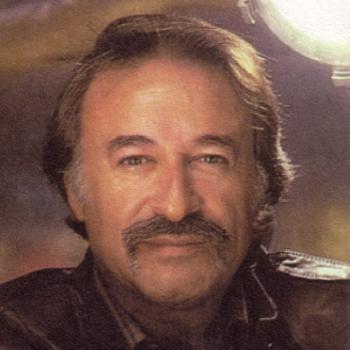
[1969]
Testo: Armando Tejada Gómez.
Musica: César Isella
Pagina ufficiale di Armando Tejada Gómez (1929-1992)
Famosa l'interpretazione di Mercedes Sosa nell'LP "El grito de la tierra" (1970)
Testo: Armando Tejada Gómez.
Musica: César Isella
Pagina ufficiale di Armando Tejada Gómez (1929-1992)
Famosa l'interpretazione di Mercedes Sosa nell'LP "El grito de la tierra" (1970)
Salgo a caminar
(continua)
(continua)
inviata da Maria Cristina Costantini 24/1/2006 - 11:06
Журавли
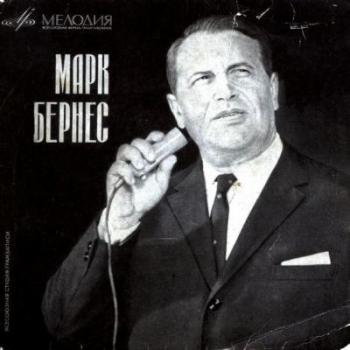
Žuravli
[1968]
Poesia di Rasul Gamzatov (ХӀамзатил Расул) scritta originariamente in lingua àvara
Dalla raccolta "Покуда вертится Земля" [1976]
Traduzione russa di Naum Grebnëv
Musica di Jan Frenkel [1969]
Interpretata da Mark Bernes [Album: Журавли, 1969]
A poem by Rasul Gamzatov (ХӀамзатил Расул) originally written in the Avar language
From the collection of poems "Покуда вертится Земля" [1976]
Russian translation by Naum Grebnyov
Music by Yan Frenkel [1969]
Performed by Mark Bernes [Album: Журавли, 1969]
Оригинальное стихотворение Расула Гамзатова на аварском языке
Из сборника стихов Покуда вертится Земля [1976]
Перевод с аварского Наума Гребнëва
Mузыка Яна Френкеля [1969]
Интерпретировал Марк Бернес [Альбум: Журавли, 1969]
Poème de Rassoul Gamzatov écrit originellement en langue avare
De la collection de poèmes "Покуда вертится Земля" [1976]
Traduction russe de Naoum... (continua)
[1968]
Poesia di Rasul Gamzatov (ХӀамзатил Расул) scritta originariamente in lingua àvara
Dalla raccolta "Покуда вертится Земля" [1976]
Traduzione russa di Naum Grebnëv
Musica di Jan Frenkel [1969]
Interpretata da Mark Bernes [Album: Журавли, 1969]
A poem by Rasul Gamzatov (ХӀамзатил Расул) originally written in the Avar language
From the collection of poems "Покуда вертится Земля" [1976]
Russian translation by Naum Grebnyov
Music by Yan Frenkel [1969]
Performed by Mark Bernes [Album: Журавли, 1969]
Оригинальное стихотворение Расула Гамзатова на аварском языке
Из сборника стихов Покуда вертится Земля [1976]
Перевод с аварского Наума Гребнëва
Mузыка Яна Френкеля [1969]
Интерпретировал Марк Бернес [Альбум: Журавли, 1969]
Poème de Rassoul Gamzatov écrit originellement en langue avare
De la collection de poèmes "Покуда вертится Земля" [1976]
Traduction russe de Naoum... (continua)
Мне кажется порою, что солдаты, [1]
(continua)
(continua)
inviata da Riccardo Venturi 24/1/2006 - 01:40
Percorsi:
Hiroshima e Nagasaki 広島市 - 長崎市
Lili Marleen [Lied eines jungen Wachtpostens]
![Lili Marleen [Lied eines jungen Wachtpostens]](img/thumb/c1600_130x140.jpeg?1328915965)
PARODIA INGLESE / ENGLISH PARODY - The Ballad of the D-Day Dodgers
LA PARODIA CANTATA DAI SOLDATI INGLESI IN ITALIA
A PARODY SUNG BY ENGLISH TROOPS IN ITALY
Questa canzone, sulla musica di Lili Marleen, era cantata dalle truppe inglesi in Italia durante la Seconda Guerra Mondiale, accusate da Lady Astor (durante un discorso al Parlamento Britannico, anche se poi l'interessata smentì di aver pronunciato quelle parole) di essere dei D-Day Dodgers, cioè di aver evitato lo sbarco in Normandia per un servizio "più leggero" nella assolata Italia... La canzone è la risposta dei soldati.
La stessa Nancy Astor si dice che sia stata la protagonista di un celebre scambio di battute con Winston Churchill: "Signor Churchill, lei è completamente ubriaco!!" - "Sì, signora, e lei è bruttissima. Però a me domani passa...".
This satire is about one of the great gaffes of World War II. England's Lady... (continua)
LA PARODIA CANTATA DAI SOLDATI INGLESI IN ITALIA
A PARODY SUNG BY ENGLISH TROOPS IN ITALY
Questa canzone, sulla musica di Lili Marleen, era cantata dalle truppe inglesi in Italia durante la Seconda Guerra Mondiale, accusate da Lady Astor (durante un discorso al Parlamento Britannico, anche se poi l'interessata smentì di aver pronunciato quelle parole) di essere dei D-Day Dodgers, cioè di aver evitato lo sbarco in Normandia per un servizio "più leggero" nella assolata Italia... La canzone è la risposta dei soldati.
La stessa Nancy Astor si dice che sia stata la protagonista di un celebre scambio di battute con Winston Churchill: "Signor Churchill, lei è completamente ubriaco!!" - "Sì, signora, e lei è bruttissima. Però a me domani passa...".
This satire is about one of the great gaffes of World War II. England's Lady... (continua)
THE BALLAD OF THE D-DAY DODGERS
(continua)
(continua)
24/1/2006 - 00:22
The March of the Dead

ALBUM: "War, War, War" (1971)
Recorded at Vanguard Studios, 71 West 23rd Street, New York City, 1971
Music composed by Country Joe McDonald,
based on poems written by Robert Service, used with permisssion
ALBUM TRACKLIST:
PART ONE
Foreword - The Call (War! War! War!) - Young Fellow, My Lad - The Man from Athabasca
PART TWO
The Munition Maker - The Twins - Jean Desprez
PART THREE
War Widow - The March of the Dead
Recorded at Vanguard Studios, 71 West 23rd Street, New York City, 1971
Music composed by Country Joe McDonald,
based on poems written by Robert Service, used with permisssion
ALBUM TRACKLIST:
PART ONE
Foreword - The Call (War! War! War!) - Young Fellow, My Lad - The Man from Athabasca
PART TWO
The Munition Maker - The Twins - Jean Desprez
PART THREE
War Widow - The March of the Dead
The cruel war was over oh, the triumph was so sweet!
(continua)
(continua)
23/1/2006 - 22:19
War Widow
ALBUM: "War, War, War" (1971)
Recorded at Vanguard Studios, 71 West 23rd Street, New York City, 1971
Music composed by Country Joe McDonald,
based on poems written by Robert Service, used with permisssion
ALBUM TRACKLIST:
PART ONE
Foreword - The Call (War! War! War!) - Young Fellow, My Lad - The Man from Athabasca
PART TWO
The Munition Maker - The Twins - Jean Desprez
PART THREE
War Widow - The March of the Dead
Recorded at Vanguard Studios, 71 West 23rd Street, New York City, 1971
Music composed by Country Joe McDonald,
based on poems written by Robert Service, used with permisssion
ALBUM TRACKLIST:
PART ONE
Foreword - The Call (War! War! War!) - Young Fellow, My Lad - The Man from Athabasca
PART TWO
The Munition Maker - The Twins - Jean Desprez
PART THREE
War Widow - The March of the Dead
'Twas with a heart of leaden woe
(continua)
(continua)
23/1/2006 - 22:18
Jean Desprez
ALBUM: "War, War, War" (1971)
Recorded at Vanguard Studios, 71 West 23rd Street, New York City, 1971
Music composed by Country Joe McDonald,
based on poems written by Robert Service, used with permisssion
ALBUM TRACKLIST:
PART ONE
Foreword - The Call (War! War! War!) - Young Fellow, My Lad - The Man from Athabasca
PART TWO
The Munition Maker - The Twins - Jean Desprez
PART THREE
War Widow - The March of the Dead
Recorded at Vanguard Studios, 71 West 23rd Street, New York City, 1971
Music composed by Country Joe McDonald,
based on poems written by Robert Service, used with permisssion
ALBUM TRACKLIST:
PART ONE
Foreword - The Call (War! War! War!) - Young Fellow, My Lad - The Man from Athabasca
PART TWO
The Munition Maker - The Twins - Jean Desprez
PART THREE
War Widow - The March of the Dead
Oh, ye whose hearts are resonant, and ring to War's romance,
(continua)
(continua)
23/1/2006 - 22:17
The Twins
ALBUM: "War, War, War" (1971)
Recorded at Vanguard Studios, 71 West 23rd Street, New York City, 1971
Music composed by Country Joe McDonald,
based on poems written by Robert Service, used with permisssion
ALBUM TRACKLIST:
PART ONE
Foreword - The Call (War! War! War!) - Young Fellow, My Lad - The Man from Athabasca
PART TWO
The Munition Maker - The Twins - Jean Desprez
PART THREE
War Widow - The March of the Dead
Recorded at Vanguard Studios, 71 West 23rd Street, New York City, 1971
Music composed by Country Joe McDonald,
based on poems written by Robert Service, used with permisssion
ALBUM TRACKLIST:
PART ONE
Foreword - The Call (War! War! War!) - Young Fellow, My Lad - The Man from Athabasca
PART TWO
The Munition Maker - The Twins - Jean Desprez
PART THREE
War Widow - The March of the Dead
There were two brothers John and James,
(continua)
(continua)
23/1/2006 - 22:16
The Munition Maker
ALBUM: "War, War, War" (1971)
Recorded at Vanguard Studios, 71 West 23rd Street, New York City, 1971
Music composed by Country Joe McDonald,
based on poems written by Robert Service, used with permisssion
ALBUM TRACKLIST:
PART ONE
Foreword - The Call (War! War! War!) - Young Fellow, My Lad - The Man from Athabasca
PART TWO
The Munition Maker - The Twins - Jean Desprez
PART THREE
War Widow - The March of the Dead
Recorded at Vanguard Studios, 71 West 23rd Street, New York City, 1971
Music composed by Country Joe McDonald,
based on poems written by Robert Service, used with permisssion
ALBUM TRACKLIST:
PART ONE
Foreword - The Call (War! War! War!) - Young Fellow, My Lad - The Man from Athabasca
PART TWO
The Munition Maker - The Twins - Jean Desprez
PART THREE
War Widow - The March of the Dead
I am the Cannon king, behold!
(continua)
(continua)
23/1/2006 - 22:15
The Man from Athabasca
ALBUM: "War, War, War" (1971)
Recorded at Vanguard Studios, 71 West 23rd Street, New York City, 1971
Music composed by Country Joe McDonald,
based on poems written by Robert Service, used with permisssion
ALBUM TRACKLIST:
PART ONE
Foreword - The Call (War! War! War!) - Young Fellow, My Lad - The Man from Athabasca
PART TWO
The Munition Maker - The Twins - Jean Desprez
PART THREE
War Widow - The March of the Dead
Recorded at Vanguard Studios, 71 West 23rd Street, New York City, 1971
Music composed by Country Joe McDonald,
based on poems written by Robert Service, used with permisssion
ALBUM TRACKLIST:
PART ONE
Foreword - The Call (War! War! War!) - Young Fellow, My Lad - The Man from Athabasca
PART TWO
The Munition Maker - The Twins - Jean Desprez
PART THREE
War Widow - The March of the Dead
Oh the wife she tried to tell me that 'twas nothing but the thrumming
(continua)
(continua)
23/1/2006 - 22:13
Young Fellow, My Lad
ALBUM: "War, War, War" (1971)
Recorded at Vanguard Studios, 71 West 23rd Street, New York City, 1971
Music composed by Country Joe McDonald,
based on poems written by Robert Service, used with permisssion
ALBUM TRACKLIST:
PART ONE
Foreword - The Call (War! War! War!) - Young Fellow, My Lad - The Man from Athabasca
PART TWO
The Munition Maker - The Twins - Jean Desprez
PART THREE
War Widow - The March of the Dead
Recorded at Vanguard Studios, 71 West 23rd Street, New York City, 1971
Music composed by Country Joe McDonald,
based on poems written by Robert Service, used with permisssion
ALBUM TRACKLIST:
PART ONE
Foreword - The Call (War! War! War!) - Young Fellow, My Lad - The Man from Athabasca
PART TWO
The Munition Maker - The Twins - Jean Desprez
PART THREE
War Widow - The March of the Dead
"Where are you going, Young Fellow My Lad,
(continua)
(continua)
23/1/2006 - 22:12
×
![]()


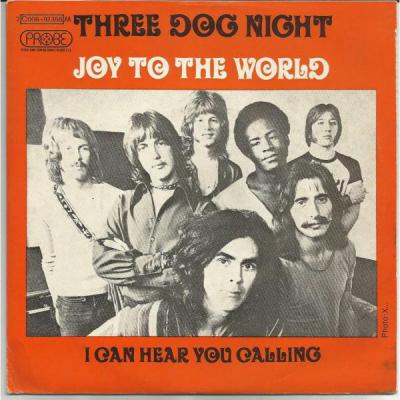
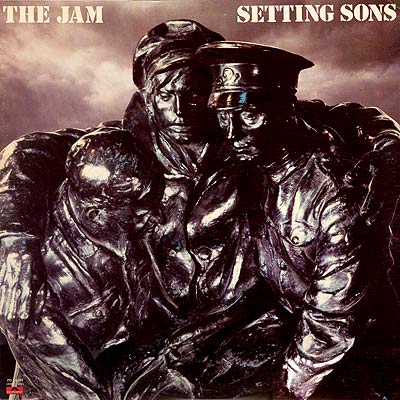
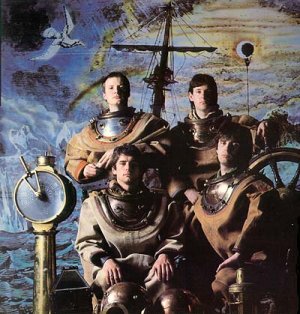
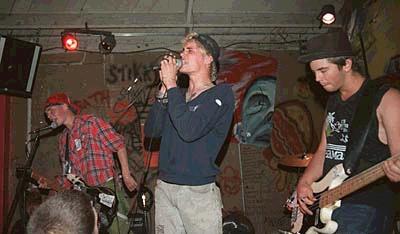

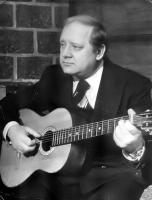
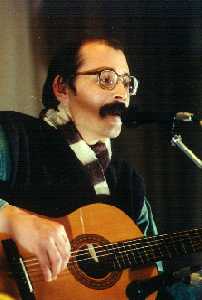
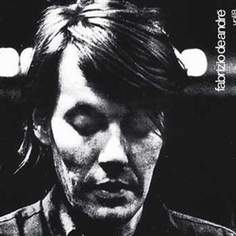
Scritta da Randy Sharp, Michael Caruso, & John Keller.
Una bella incisione si trova nell'album "A real life story" della cantante irlandese Maura O'Connell